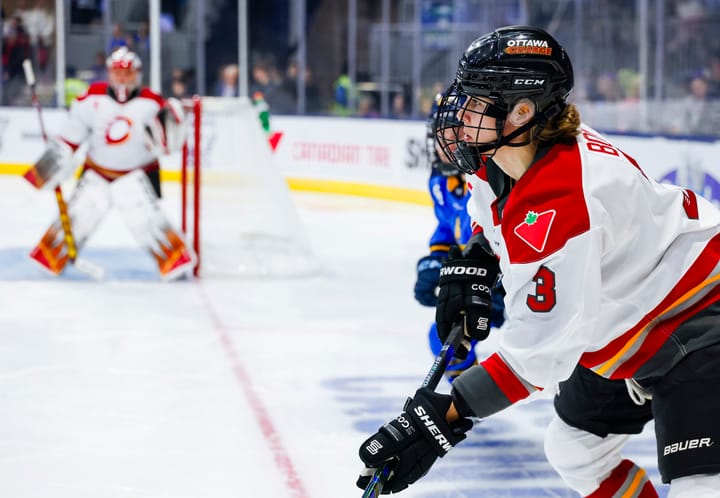Reflections on Game Three of the 2019 Rivalry Series
Breaking down Canada’s 2-0 win in Detroit
With their 2-0 win over Team USA yesterday, Team Canada won the inaugural Rivalry Series. As you might expect, there’s a lot to unpack from yesterday’s game at Little Caesar’s Arena. Let’s turn the spotlight on some of the biggest storylines from Canada’s Game Three win over Team USA.
Related
Goal by Goal: Game 3 of the Rivalry Series
Shots and Saves
Per USA Hockey’s stats for the game, USA out-shot Canada by a margin of 38-17 thanks in large part to a 21-shot second period for the Americans. My own personal tracking of the game, which was admittedly an amateur effort, was far less generous to the home team. I had USA with around 28 shots to Canada’s 19 shots. With that being said, the U.S. had a lot of second and third chances around Canada’s crease in the last two periods.
Regardless of what you think of the shot totals, there’s no denying that Shannon Szabados had a brilliant game. She earned every bit of her shutout and stonewalled four power plays for Team USA. Szabados was the first star of the game by a mile.
.@ShannonSzabados WITH THE SHUTOUT! Canada wins the Rivalry Series 2-0 over the USA! #RivalrySeries pic.twitter.com/6tcOtnV1Xg
— Women's Sports Highlights (@WSportHilites) February 17, 2019
Sunday’s Standouts
Team Canada’s goaltender wasn’t the only player who had a big game in Detroit.
In a way, it’s shame that Savannah Harmon’s goal 2:23 into the third period was disqualified. Not only would it have changed the complexion of the game, it also would have been her first goal with the senior national team. Harmon didn’t register a shot on goal in Game Three, but her skill and confidence with the puck on her stick was evident all game long.
Savannah Harmon might have scored her first goal on the Senior team #RivarlySeries pic.twitter.com/984e85lLxI
— Women's Sports Highlights (@WSportHilites) February 17, 2019
Brianna Decker led the pack yesterday with seven shots on goal. Decker also drew a penalty in the first period and was one of the few players who was able to maneuver through Canada’s neutral zone defense. She definitely out-shined the other two-thirds of Team USA’s most talented triumvirate in Detroit.
Another Rivalry Series game, and another big performance from Team Canada’s line of Blayre Turnbull, Laura Stacey, and Jamie Lee Rattray. In the first period Rattray made a gorgeous pass to set up an even prettier goal by Turnbull. That goal proved to be the game winner. A lot can change with Canada’s roster before the 2019 Women’s World Championship, but this trio might just be too good to break up.
It’s also worth noting that Hayley Scamurra was on the ice for Team USA after Bob Corkum pulled his goalie and was desperate for a goal. She was credited with two shots in the game and definitely helped her chances of making the U.S. roster in April.
Canada’s Neutral Zone
No, there isn’t a word missing from that sub-heading. The neutral zone belonged to Canada for the entirety of the Rivalry Series and Game Three was no different.
The Canadians forced Team USA to take two icings on the power play and three icings at 5v5 yesterday. Meanwhile, all three of Canada’s icings — one of which took place after Team USA pulled their goalie — came in the third period, when they were sitting on 2-0 lead.
Canada clogged up the neutral zone both at even strength and during Team USA’s power plays, which forced the Americans to rely too much on the dump-and-chase. Judging by the optics, Team USA simply couldn’t match Canada’s ability to enter the offensive zone with control of the puck. Most of their best chances came as a result of their aggressive forecheck, which definitely put pressure on Canada’s defenders throughout the series.
Team Canada was bigger on paper, but this had more to do with tactics than size. Team USA simply couldn’t solve the riddle of Canada’s neutral zone defense with any kind of regularity. Without a doubt, Canada’s dominance of the neutral zone stymied Team USA’s offense.
Special Teams
There’s no doubt that Team Canada won the special teams battle yesterday and in the series in general. Team USA went 0-for-4 on the power play on Sunday after going 1-for-4 on the power play in the first two games of the series combined. Meanwhile, Canada went 3-for-11 on the power play in the series.
It was also surprising to see Team USA take the first three penalties of Game Three, especially their head coach’s comments following Game Two’s 4-3 loss. Just like it did in Game Two, that lack of discipline proved costly to Corkum’s team. Brianne Jenner’s power play goal 4:40 into the first period proved to be the game-winner. Overall, Canada’s power play looked far better than Team USA’s.
Erin Ambrose and Renata Fast also deserve a lot of credit for the way they moved the puck on Canada’s power play. We so often think and talk about Marie-Philip Poulin pulling the strings on Canada’s power play — and she absolutely does — but Canada has a few rising stars on their blue line who deserve a lot more attention than they’ve been getting.
Data courtesy of USA Hockey, Hockey Canada, and the author’s own tracking.
Related
Reflections on the first two games of the 2019 Rivalry Series





Comments ()